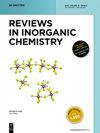生物合成氧化锌纳米颗粒综述:合成、表征及其应用
IF 3.1
3区 化学
Q1 CHEMISTRY, INORGANIC & NUCLEAR
引用次数: 0
摘要
纳米技术是二十一世纪最具创新性的领域。全世界都在为纳米产品的商业化进行深入研究。在过去的几十年里,纳米材料,尤其是纳米颗粒,因其相对于大块材料的独特或改进的物理和化学性质,受到了人们的极大关注。作为对环境无害的替代品,纳米粒子目前正通过植物或微生物介导的合成方法进行 "生物 "生产。由于 ZnO NPs 具有出色的生物相容性、经济性、低毒性和成本效益,它已成为各种应用中最广泛使用的金属氧化物纳米粒子之一。有趣的是,由于其在医疗、健康、环境和经济方面的多重优势,人们发现利用植物材料进行合成的绿色技术非常适合生产氧化锌纳米粒子。人们采用了多种表征方法来评估采用绿色策略生产的氧化锌纳米粒子的特性,包括 X 射线衍射(XRD)、扫描电子显微镜(SEM)、透射电子显微镜(TEM)、傅立叶变换红外光谱(FTIR)和紫外可见光谱等。这些技术的价值在于揭示 ZnO NPs 结构、形态和光学特性的重要信息。为了支持未来的生物医学和其他研究,本综述概述了氧化锌氮氧化物绿色合成的最新进展,重点介绍了植物、细菌、真菌和藻类等天然来源的氧化锌氮氧化物及其表征和各种应用,包括抗菌、抗癌、抗氧化、光催化、抗炎、抗糖尿病和抗衰老等应用。本文章由计算机程序翻译,如有差异,请以英文原文为准。
A review on biogenic synthesized zinc oxide nanoparticles: synthesis, characterization, and its applications
Nanotechnology is the most innovative field of the twenty-first century. Worldwide, intensive research is being done to commercialize nano products. Due to their unique or improved physical and chemical properties relative to bulk material, nanomaterials, especially nanoparticles have seen an enormous interest over the past few decades. As environmentally benign alternative nanoparticles are currently being produced “biologically” by means of plant or microorganism-mediated synthesis. Due to its outstanding biocompatibility, affordability, and low toxicity, and cost-effectiveness, ZnO NPs have emerged as one of the most widely used metal oxide nanoparticles in various applications. Interestingly, due to its multiple medical, health, environmental, and economic advantages, the green technique of synthesis employing plant materials has been discovered to be suitable for the production of ZnO nanoparticles. A variety of characterization methods have been used to assess the characteristics of ZnO NPs produced with green strategies, including X-ray diffraction (XRD), scanning electron microscopy (SEM), transmission electron microscopy (TEM), Fourier-transform infrared spectroscopy (FTIR), and UV–Vis spectroscopy and others. The value of these techniques reveals important information about the structural, morphological, and optical characteristics of ZnO NPs. In order to support future biomedical and other research, this review provides an overview of recent developments in the green synthesis of ZnO NPs with a focus on natural sources such as plants, bacteria, fungi, and algae as well as their characterizations, and various applications, including, antimicrobial, anticancer, antioxidant, photocatalytic, anti-inflammatory, anti-diabetics, and anti-aging applications.
求助全文
通过发布文献求助,成功后即可免费获取论文全文。
去求助
来源期刊

Reviews in Inorganic Chemistry
化学-分析化学
CiteScore
7.30
自引率
4.90%
发文量
20
审稿时长
1 months
期刊介绍:
Reviews in Inorganic Chemistry (REVIC) is a quarterly, peer-reviewed journal that focuses on developments in inorganic chemistry. Technical reviews offer detailed synthesis protocols, reviews of methodology and descriptions of apparatus. Topics are treated from a synthetic, theoretical, or analytical perspective. The editors and the publisher are committed to high quality standards and rapid handling of the review and publication process. The journal publishes all aspects of solid-state, molecular and surface chemistry. Topics may be treated from a synthetic, theoretical, or analytical perspective. The editors and the publisher are commited to high quality standards and rapid handling of the review and publication process.
Topics:
-Main group chemistry-
Transition metal chemistry-
Coordination chemistry-
Organometallic chemistry-
Catalysis-
Bioinorganic chemistry-
Supramolecular chemistry-
Ionic liquids
 求助内容:
求助内容: 应助结果提醒方式:
应助结果提醒方式:


